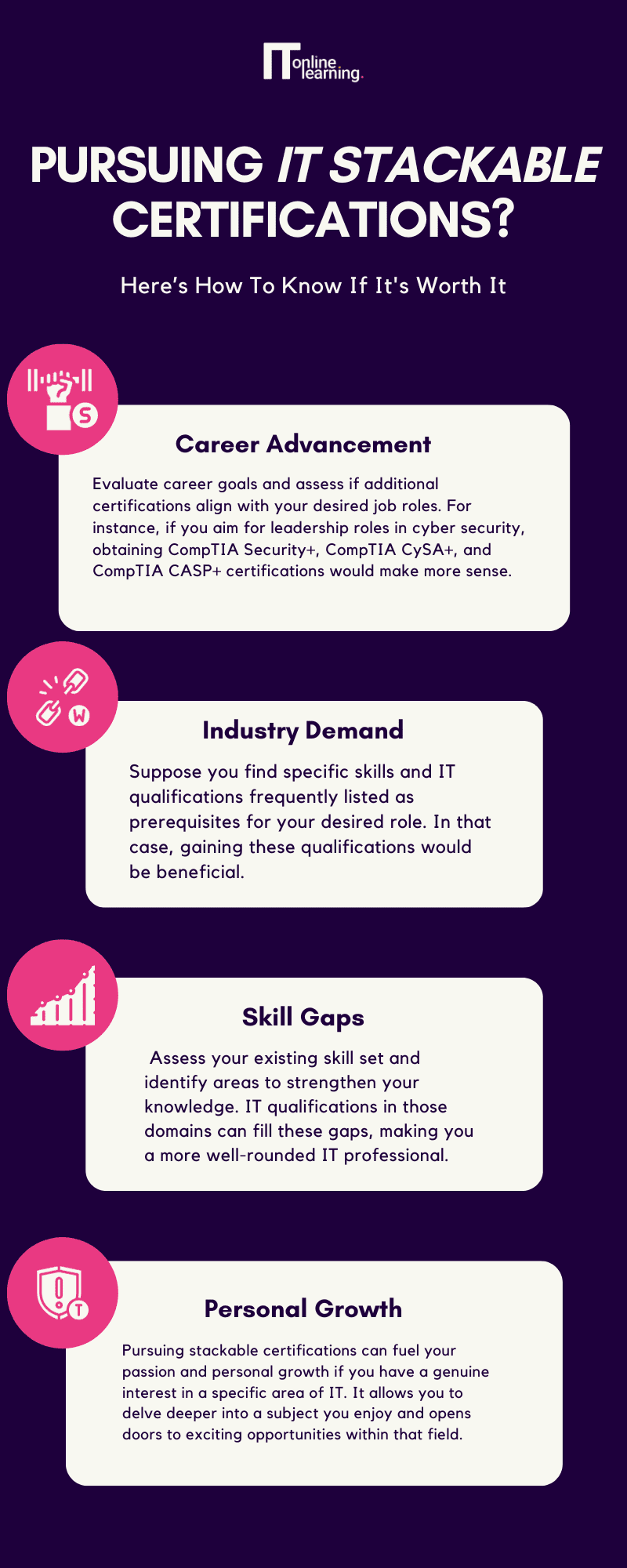In the epic conclusion of the Avengers film series, our beloved heroes, including Captain America, Iron Man, Scarlet Witch & others, made personal sacrifices for the benefit of others.
Similarly, technology professionals sacrifice time, effort, and resources to advance their careers.
One thing about the IT industry is: this sector requires professionals to keep up with the latest technologies.
Certifications are, to this end, crucial, as they increase job satisfaction and lead to higher earnings & job security.
Enter CompTIA stackable certifications – powerhouse qualifications that fuel exciting careers.
These IT and Networking certifications act as building blocks, allowing you to assemble a robust skill set and gain specialised knowledge in any field of Information Technology.
These certifications cover specialist disciplines, including networking, cyber security, and cloud computing – IT fields we will explore in-depth in this blog.
Whether you are just starting or looking to enhance your skills, CompTIA stackable certifications offer a flexible and comprehensive pathway for professional development.
Continue reading as we explore the benefits of these certifications, how they work, and the two career pathways available to you.
What are CompTIA certifications?
CompTIA certifications are industry-recognised credentials validating IT professionals’ skills and knowledge.
Developed by the Computing Technology Industry Association (CompTIA), these certifications cover various domains of IT, enabling you to showcase your knowledge, expertise, and experience, all while enhancing your career prospects.
CompTIA offers certifications in multiple tracks, including core certifications like:
CompTIA A+, which validates essential skills in hardware, software, networking, and security.
Infrastructure certifications focus on specific aspects of IT infrastructure, CompTIA Network+, CompTIA Server+, and CompTIA Security+.
Cyber security certifications like CompTIA Security+ and speciality certifications for specific IT roles and technologies, such as CompTIA Linux+ and CompTIA Cloud+, can also be pursued.
Important: Each certification comprises exams assessing your knowledge and skills. These vendor-neutral exams (they are universally applicable) focus on fundamental concepts relevant across technologies and platforms.
CompTIA Certifications: Exploring Their Real-World Benefits.

These certifications are widely recognised and respected in the IT industry, across the UK and are designed to enhance your career prospects.
Here are some key benefits supported by research and findings:
- Increased employability: CompTIA certifications validate an individual’s knowledge and skills in various areas of information technology. Remember: In the technology sector, employers tend to favour candidates with specialist IT certifications – they demonstrate a commitment to professional development and a solid foundation in IT concepts.
A survey conducted by CompTIA revealed that 96% of HR managers consider IT certifications when hiring or promoting employees.
- Career advancement opportunities: Because they are skills-based and focus on practical implementation – CompTIA certifications boost career opportunities and help professionals advance within their current organisations if they so wish.
Research by Global Knowledge showed that 91% of IT professionals believe that certifications are beneficial for career advancement.
- Industry recognition: These IT courses are globally recognised and across industries. They provide a standardised measure of expertise, ensuring certified professionals possess the necessary skills to perform specific job roles to a high level.
The result?
Recognition of skills and competency increases, and so does respect from colleagues, clients, and employers.
- Skill enhancement and knowledge validation: Earning these IT certifications is not easy and involves rigorous training and testing to ensure you acquire in-depth knowledge of the specific subject matter.
However, we are certain the certification process will benefit you with practical skills and up-to-date knowledge to apply to real-world work situations.
The result?
Your ability to do your job effectively increases, as does your confidence in your own abilities.
- Increased earning potential: In a study conducted by Foote Partners LLC, it was found that IT professionals with CompTIA certifications earned salaries that were, on average, 5-15% higher than their non-certified colleagues.
Learn Technology skills with ITonlinelearning
As an education provider helping people upskill, reskill and pursue specialist careers, we recommend these accredited qualifications to people looking for career advancement in IT.
As ITonlinelearning – we’ve helped people with different experience levels and knowledge gain accredited IT certifications and land entry to mid-level jobs as help desk technicians, PC support specialists, and desktop support engineers, among other roles.
What Are CompTIA Stackable Certifications?
Stackable certifications in the IT industry refer to the concept of combining multiple certifications from the same vendor or organisation to build a cohesive and comprehensive skill set.
Think of it like building a sports team: you have individual players with specific skills, but they form a strong and well-rounded team when they come together.
Similarly, CompTIA offers stackable certifications that allow IT professionals to gradually enhance their skills and expertise.
Starting with foundational certifications like CompTIA A+, you can add specialised certifications such as CompTIA Network+ and CompTIA Security+ to expand your knowledge.
Stacking these certifications creates a pathway for career growth and demonstrates proficiency in multiple areas of IT.
How Do CompTIA Stackable Certifications Work? – A Breakdown
These certifications follow a step-by-step path that builds skills and knowledge on top of each other.
1. Start with a Foundation: The CompTIA A+ certification is the bedrock for an IT career. It covers essential hardware, software, networking, and troubleshooting concepts.
Sports analogy, anyone?
CompTIA A+ is like learning the basics of a sport. Before moving forward, you must understand the rules, equipment, and fundamental skills.
2. Specialise with Intermediate Certifications: Once you have your foundation, it’s time to specialise. CompTIA offers intermediate certifications like CompTIA Network+, CompTIA Security+, and CompTIA Cloud+.
3. Enhance with Advanced Certifications: CompTIA provides advanced certifications. For example, if you are interested in security, you could pursue CompTIA CySA+ (Cybersecurity Analyst) or CompTIA CASP+ (Advanced Security Practitioner).
4. Stack and Showcase Your Skills: As you earn multiple certifications, you can stack them together to demonstrate your comprehensive knowledge and skills to employers.
5. Plan Your Career Path: Thankfully, CompTIA provides a detailed roadmap on the recommended order to earn stackable certifications, making career progression as simple as following a laid-out path to your career goals.
6. Continuous Learning and Renewal: IT evolves and moves faster than a rat up a drainpipe. To stay relevant, you must continuously learn, renew your certifications periodically, and explore new certificates as they become available.
The CompTIA Stackable Certification Path
Obtaining CompTIA stackable certifications involves a well-defined roadmap for IT professionals to progress through.
Here’s a step-by-step guide:
Start with the Fundamentals: Begin your journey with CompTIA A+. This certification covers essential IT skills such as hardware, software, networking, and troubleshooting.
It serves as the foundation for further specialisation.
Choose Your Specialisation: Select a specialisation track based on your career goals and interests.
Expand Your Expertise: Once you have obtained your first certification, continue building your skill set.
Branch Out or Deepen Your Knowledge: Depending on your career path, you can either broaden your skills by exploring specialisations in different domains or deepen your expertise by pursuing advanced certifications.
Keep Growing: These qualifications empower continuous growth. Look for opportunities to acquire additional certifications based on emerging technologies or job requirements.
CompTIA Stackable Certifications: The Two Career Pathways Available To You
Infrastructure Pathway:
The CompTIA Infrastructure Pathway teaches the essential skills to excel at IT operations.
For specialist and early-career IT professionals with less than two years work experience
This certification pathway focuses on essential IT operations skills. It combines CompTIA A+ and CompTIA Network+ certifications, covering various foundational knowledge areas:
- CompTIA A+ covers hardware and software fundamentals.
- CompTIA Network+ delves into networking concepts, protocols, and troubleshooting.
The Systems Support Specialist certification combines CompTIA A+ and Linux+:
- CompTIA A+ provides a solid understanding of hardware and software troubleshooting.
- CompTIA Linux+ focuses on Linux operating systems, command-line usage, scripting, and system administration.
For professional and mid-level IT professionals with two – five years of work experience
This certification pathway combines CompTIA Network+ and CompTIA Cloud+:
- CompTIA Network+ focuses on networking expertise.
- CompTIA Cloud+ focuses on cloud computing principles, virtualisation, and deployment models.
Note: The Cloud Admin Professional certification prepares individuals for roles in cloud administration.
The Network Infrastructure Professional certification combines CompTIA Network+ and CompTIA Server+:
- CompTIA Network+ provides a comprehensive understanding of networks, protocols, and security.
- CompTIA Server+ focuses on server hardware, virtualisation, storage, and disaster recovery.
This certification pathway combines CompTIA Network+ and CompTIA Linux+:
- CompTIA Network+ covers network concepts, protocols, and troubleshooting.
- CompTIA Linux+ focuses on Linux operating systems, command-line usage, scripting, and system administration.
Note: The Linux Network Professional certification validates skills in Linux networking environments.
Cybersecurity Pathway:
The CompTIA Cyber Security Pathway empowers IT professionals with the knowledge and skills to build cybersecurity expertise.
For Specialist and early-career IT professionals with less than two years work experience
This certification validates your expertise in building and managing secure infrastructure.
It covers essential topics:
- CompTIA A+ (hardware and software),
- CompTIA Network+ (networking fundamentals),
- CompTIA Security+ (security best practices).
For professional and mid-level IT professionals with two – five years of work experience
With a focus on cloud security, Secure Cloud Professional combines the knowledge of CompTIA Security+ (security foundations) and CompTIA Cloud+ (cloud infrastructure and security) to help you secure cloud environments effectively.
Security analytics builds skills to analyse and respond to security threats. It encompasses the knowledge of CompTIA Security+ (security essentials) and CompTIA CySA+ (security analytics and response).
Network Vulnerability Assessment Professional focuses on identifying and mitigating network vulnerabilities. It combines the expertise of CompTIA Security+ (network security) and CompTIA PenTest+ (penetration testing techniques).
Network Security Professional encompasses a comprehensive set of skills in network security.
It covers the domains of CompTIA Security+ (security fundamentals), CompTIA PenTest+ (penetration testing), and CompTIA CySA+ (security analytics).
For expert and established IT professionals with over five years of work experience.
This expert-level certification solidifies your proficiency in security analytics. It includes the knowledge of CompTIA Security+ (security foundations), CompTIA CySA+ (advanced security analytics), and CompTIA CASP+ (enterprise security solutions).
Secure Infrastructure Expert combines multiple domains of expertise. It encompasses the knowledge of CompTIA Security+ (security principles), CompTIA CySA+ (advanced security analytics), CompTIA PenTest+ (penetration testing), and CompTIA CASP+ (enterprise security solutions).
ITonlinelearning tips: Each certification builds from the other, helping you build a well-rounded skill set that’s sought after in the industry.
Browse now: Accredited IT and Networking certifications.
How To Know If It’s Worth Pursuing IT Stackable Certifications?
Pursuing multiple stackable certifications takes work and requires significant time and resources.
Here are some indicators to help determine if it’s worth pursuing for you:

Sacrifice Like an Avenger and Achieve IT Career Success
We have covered a lot about CompTIA stackable certifications!
To recap, I ask you to keep this in mind:
In your pursuit of success in an IT career, sacrifices matter.
Just like the Marvel Avengers heroes we witnessed sacrificing for a greater goal in the Marvel movies, IT professionals must be willing to make sacrifices to achieve their professional goals.
After all, sacrifice to achieve career goals is an indicator of someone that’s dedicated, hard-working, and committed – Traits that matter if interested in establishing yourself in this field.
Similarly, CompTIA courses offer a direct path for practising professionals and people interested in Information Technology to build a solid foundation of skills, specialise in specific domains, and demonstrate their expertise.
These certifications are proof of your commitment to continuous learning and skills development.
CompTIA Stackable Certifications: Frequently Asked Questions
A stackable certification combines multiple certifications from the same vendor to build a comprehensive skill set.
Yes, they expire three years after they are earned. They can be renewed through CompTIA’s continuing education (CE) programme.
If you earn the CompTIA CySA+ and CompTIA Security+ certifications, you will also receive the CompTIA Stackable Certificates: CompTIA Cybersecurity Analyst (CySA+) and CompTIA Secure Infrastructure Specialist (Security+).
Start with CompTIA A+ as it establishes a strong foundation for your IT career.
The CompTIA trifecta combines CompTIA A+, CompTIA Network+, and CompTIA Security+ certifications, forming a powerful trio of foundational IT knowledge.
Stacking in education refers to accumulating certifications or qualifications to build expertise in a specific field.
The difficulty of A+ or Security+ depends on individual experience and knowledge. Both are beginner-friendly, but A+ covers a broader range of topics.
Yes, beginners can take CompTIA A+. It is an entry-level certification designed to validate foundational IT skills.
Yes, CompTIA Security+ is considered an entry-level certification focusing on cybersecurity fundamentals.
While CompTIA Network+ is not a prerequisite for CompTIA Security+, it provides a solid understanding of networking concepts that can benefit CompTIA Security+ candidates.
After CompTIA Security+, the next step can be pursuing more advanced certifications.






